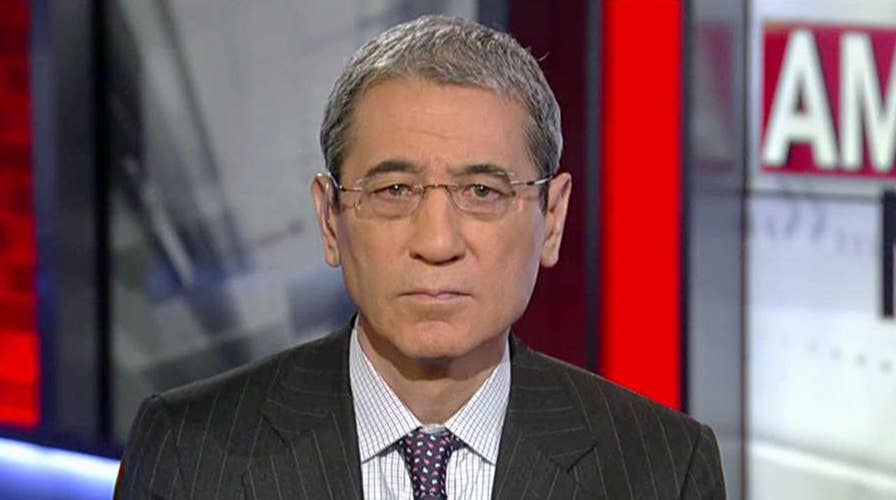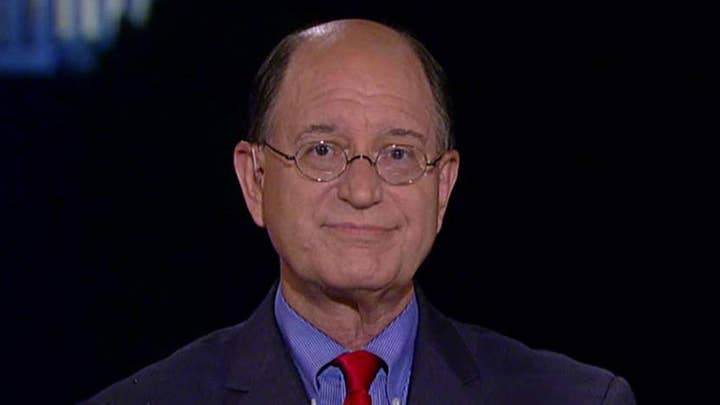Gordon Chang: China understands the effects of US sanctions
Gordon Chang discusses the effectiveness of sanctions against North Korea's allies
President Trump on Sunday appeared to rebuke South Korea for its “talk of appeasement” with North Korea prior to this weekend’s huge nuclear test, saying Pyongyang only “understands one thing.”
“South Korea is finding, as I have told them, that their talk of appeasement with North Korea will not work, they only understand one thing!'' Trump said on Twitter.
Some questioned Trump's jab at an important U.S. ally.
Patrick Cronin, an Asia expert with the Center for a New American Security, said Trump's comment on South Korea was probably "intended to stiffen the spine of an ally." He said he agreed with the intention.
"I think Washington is very serious about showing some unexpected resolve," he said. "We need our ally and we need to remain ironclad. But at the same time, we can't afford South Korea to go weak in facing down this growing danger."
Kim Jong Un's regime on Sunday claimed "perfect success" in an underground test of what it called a hydrogen bomb. It was the North's sixth nuclear test since 2006 — the first since Trump took office in January — and involved a device potentially vastly more powerful than a nuclear bomb.
Ely Ratner, a national security official in the Obama administration, told The New York Times that the U.S. is going to need “close cooperation with not only South Korea but China as well, he’s coming out swinging at all of them rather than trying to build support and coordination.”
Trump also suggested putting more pressure on China, the North's patron for many decades and a vital U.S. trading partner, in hopes of persuading Beijing to exert more effective leverage on its neighbor. Trump tweeted that the U.S. is considering "stopping all trade with any country doing business with North Korea." Such a halt would be radical. The U.S. imports about $40 billion in goods a month from China, North Korea's main commercial partner.
Ratner told The Times that this weekend’s test may have a “chance of pushing China into a place it’s never been before.”
Trump warned last month that the U.S. military was "locked and loaded, should North Korea act unwisely" and that the U.S. would unleash "fire and fury" on the North if it continued to threaten America. The bellicose words followed threats from North Korea to launch ballistic missiles toward the U.S. Pacific territory of Guam, intending to create "enveloping fire" near the military hub that's home to U.S. bombers and other aircraft.
The U.S. has about 28,000 troops stationed in South Korea and is obliged by treaty to defend it in the event of war.
In South Korea, the nation's military said it conducted a live-fire exercise simulating an attack on North Korea's nuclear test site to "strongly warn" Pyongyang over the latest nuclear test. Seoul's Joint Chiefs of Staff said the drill involved F-15 fighter jets and the country's land-based "Hyunmoo" ballistic missiles. The released live weapons "accurately struck" a target in the sea off the country's eastern coast, the JCS said.
"Denuclearization is not a viable U.S. policy goal," said Richard Fontaine, president of the Center for a New American Security, but neither should the U.S. accept North Korea as a nuclear power. "We should keep denuclearization as a long-term aspiration, but recognize privately that it's unachievable anytime soon."
The Associated Press contributed to this report






